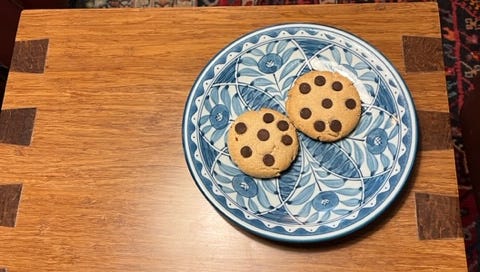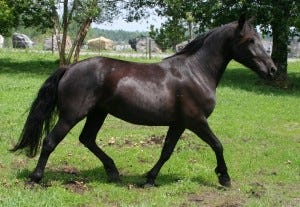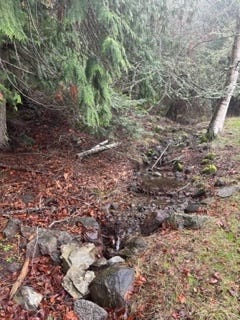The first time I heard a dead person speak to me, my husband and I were in the car. Maybe driving is an in-between state where our minds relax and open.
A good friend, a nurse, had died. She’d been dealing with a tumour so big it looked like she was pregnant. I knew she believed in something large and wonderful—Presence, if you will. My friend never complained, just radiated calm, though I understood she was disappointed not to have found healing through either medicine or prayer. Her death had hit me hard; when her sister called with the news, all night long it felt like I’d ricocheted between holding her up in love and then getting sideswiped by sorrow.
Canadian horse, From Wikipedia Commons, Image by David Campbell
By the time of the car trip, three weeks later, my friend’s death had receded into the background. The urgency of her death, and trying to accept it, had passed. I was looking at a barn beside the highway with lots of beautiful black Canadian horses, when I heard my friend say, “Zoë! You wouldn’t believe the gardens here!” What a teaser. Of course, I asked for more, but that was it. I never heard from her again.
What goes on after death? It’s a mystery. I do end up feeling, however, it may be a more active mystery than what I had previously assumed. From my state of existence, the dead appear to be on a journey; they feel further away as time goes on. I only ever get an occasional remark, mostly out of the blue. A couple of years after my dad died, I was in the car, again with my husband driving. We were on Highway 3 from the interior of BC, coming over a mountain pass. The view was so wonderful, I thought, Dad would like this. “Thanks for thinking of me, dear,” he said. And that was it. Poke and try as I might, there was no more.
None of my family talked about ghosts; there was an indifference to anything other than the meat-and-potatoes world. We had enough problems to deal with, thank you very much, like alcoholism and family abuse, with PTSD for relatives who served on the frontlines in both world wars. My mother called herself sixth-generation Canadian. However, according to Ancestry DNA, we have a Celtic background, 55% Irish, 40% Welsh and 5% Scottish. There were no psychics we know about. Our family was educated, women and men both: nurses, teachers, scholars, a doctor or two, and lots of clergy; we were not what my aunt once scathingly referred to as, “Bog Irish.”
However, my sister and I were different. “You’re fey,” our brother said flatly. That was a larger claim than I wanted to make for myself. In my experience, lots of people talk to their dead, they were just very circumspect about it. “I don’t even tell my daughter the things I’ve been telling you about experiences with my husband,” a widow at a spiritual retreat told me recently.
My dad has been dead for several decades. I don’t hear from him anymore, but I often think of him with fondness. Now, in my kitchen, I say to him, “You were right about simmering spaghetti sauce.” I’m pleased that I’m cooking. It doesn’t always happen. Do I get lazy in the evening, get stuck on pause because I’m hungry, or just run out of ideas? Any of the above can bring on paralysis, and then the eventual late eating of scrappy suppers, some quite horrible.
Well, that won’t happen tonight. I remember my dad saying spaghetti was one of those dishes that never lost its appeal at his house. When you start with good ingredients and let them take several hours gently cooking, the whole place fills with an aroma that’s very reassuring. It says, This is a good place. Someone is looking after the people who live here. Even if that’s just one person and I make spaghetti much less than I used to five years ago.
This morning, as I sauté onions and celery, then meat and garlic, I’m listening to Hildegard of Bingen’s choral music. It’s soothing. I discovered her music after my husband died and I couldn’t bear to listen to straightforward melodies. My thoughts are not so fractured as they were then, but I still enjoy Hildegard’s slightly eerie harmonies.
It’s been a difficult week. A publisher is making a grab for rights to my first book with increasingly bullying emails and I’ve had a disagreement with a friend. I’ve taken the steps I can to set each situation right, now all that remains is to regain a sense of equilibrium.
“Now Zoë,” I can pretty much hear my mom say. I know she wants me to be gentle with myself. When she was eighty, she told my sister and I, “Inside I still feel like a girl of sixteen. Then I look in the mirror and say, ‘Who is this old woman’?”
I blend up my tomatoes and add them along with tomato paste to the saucepan. “I remember, Mom,” I tell her. I’m not as old as my mother was then, but being anxious makes me feel vulnerable and like a kid. I detest that. Surely being older means we develop more strategies?
I pull out left-over chicken gravy from the freezer and add some to my spaghetti sauce, a trick I learned from my mother. It gives an extra depth to the flavour without being distinguishable.
Outside the kitchen window, mist clings to the spaces between the firs, softens their edges. The sun goes in, comes out. It’s November. The first big storm of the season was due over the weekend and it skipped our island. No wind, just drizzle then steady rain, not the atmospheric river that had been predicted. However, this morning it was so dark I clung to my easy chair until nine and moaned to myself about taking the dog for a walk. Then, when we were finally out on the trail, the sun emerged. Ah, magic.
Now we’re home and I’m cooking, partially to make myself feel better about this hard week. Whose approval am I after, really?
After my husband died, my neighbour, a police officer who’s lost a number of people close to him, told me, “The relationship we have with our dead continues. The relationship changes, that’s all.” I found that an extraordinarily helpful remark. It was very far removed from the, Well, let’s just get on with things attitude that many people seemed to want me to cultivate. A willed amnesia.
“I think we come to understand different things about people when they’re dead,” my friend Nicola said recently. Recently, her mom and dad died within a year of one another and she was seeing them in a way she was unable to when they were alive; it was a lot to process.
With the death of someone you love, there was loss and in some instances, a cold, lonely kind of freedom.
It was the flashes of insight, Nicola looking at archival pictures of her her great-grandmother and her grandfather and knowing, in an electric sizzle, something about her mother she hadn’t understood before that I wanted to lean into. It was me, understanding at long last what my mom meant when she apologized to me in the last few days of her life for not being able to spend more time with me when my three sibs were younger. At the time, I had brushed it off, of course she’d been a busy mother.
But then on a walk one day I saw myself as I’d been in a photograph, a six-year-old with shoulder-length fair hair neatly brushed, a barrette trying to hold it out of her eyes, making her mother’s bed to get her attention; hadn’t her mom said she noticed every effort the girl made to help? And the girl had cried bitterly when her mom hadn’t seen it.
Isn’t that still me now, trying to do good, to be good in order to feel loved?
We have a notion that there’s the past and time flows like a river toward the future, as if what-is-yet-to-be is a city we’ll one day arrive at on our little raft of now. In quantum physics, String Theory considers the idea of time as a giant block where everything that ever will happen is occurring all at once in a chunk of ten dimensions. I like this idea. As I age, there’s a comfort in feeling I’m directly adjacent to nine other dimensions; it’s all happening right in the present.
In the kitchen, I shake a generous amount of oregano, a pinch of red pepper flakes into my pan. When the sauce is nearly cooked, I’ll add a block of fresh basil I minced and froze in an ice cube tray last month, and sauté some mushrooms.
Sometimes as we understand more about our dead, they might see more about us, too.
I live on Pender Island. Last week as I was on the Roe Lake trail, I came down the slope where my husband and I always used to stop for a moment and gaze out at the water. Away from the trees, looking toward the west, it was brighter and the view had brought a lift of the heart each time we reached that spot. This time, as I paused, I heard my husband say, “You know, I didn’t appreciate what you did for me when I was alive.”
“I am aware of that,” I said tartly. The dynamic between us had been that I was expected to comment favourably on every chore or repair done around the house. “Only you could do this, Garney.” My husband was a hard-working man, however, it was a joke with an edge as far as I was concerned, as it didn’t extend to recognizing my contributions.
My husband’s ghost or his essence or maybe my longing, whatever it was talking to me, said, “I didn’t see it. I couldn’t see it, I suppose.” And then he told me something so much larger and more personal about the kind of person he’d become as the result of our relationship that I had to fish in my jacket pocket for a hankie. I never would have thought to put it in those terms but I could see why my husband said what he did, and the justice of it made me breathe in pure thankfulness. It was like for a moment, the whole fragmented world made sense.
Who are we walking around but our wounds, our hopes, our fears? Where do they come from? Childhood, usually. Who was there? Family. Is this the function of getting older, allowing oneself enough head space to listen to our dead, to re-imagine our relationships with them? Certainly our dead were wounded too.
Now, with the spaghetti simmering, I start making tahini chocolate chip cookies, propelled by wanting to give a few to a friend who’s sick, that and spaghetti.
When we step up and own our own pain, do we take a step toward becoming an elder rather than just older? I know I see historical patterns more clearly, however, family dynamics hurt. There can be a desire on my part to shy away from connecting. But the dead don’t let us. We talk to them and let it be said, they talk to us.
How much do I make up? I can’t tell.
Last week I was surprised to feel my dear friend Clarice, who died a year ago, elbow me in the ribs. “Al,” she said. Al was her husband; they’d been married for 62 years. I was cooking minestrone—this makes it sound like all I do is cook, which isn’t true—but maybe these are unguarded moments when I can hear more clearly.
“Okay,” I replied. I knew Clarice was thinking about all the vegetables in the soup and that Al needed more vegetables. I’d stayed in touch with him but hadn’t been willing to take on too much responsibility; I had a hard enough time managing myself, and besides, he had two daughters. But a container of soup, that I could do. When I called Al a few minutes later, he told me he had cancer and was undergoing chemo. I thought, Good call, Clarice. It was the first time I’d heard from her.
After my mom died, for a few weeks after, at intervals I’d smell cigarette smoke. Mom was a smoker; she smelled like cigarettes and face powder. At first, I found these olfactory hallucinations embarrassing. I mean, whoever heard of such a thing? Because I could smell that smoke absolutely distinctly. I’d be working in my garden, alone but for the dog, and then I’d smell cigarettes. I’d endure it for as long as I could, then whip around, sure someone had snuck up on me. Nothing. No one.
After Mom’s death, one neighbour had been very helpful to our family. I wanted to acknowledge the neighbour with a gift certificate to Mom’s favourite restaurant in Steveston; she and I had had many happy meals there. I drove to Steveston, and with some difficulty, as it was a popular spot, managed to squeeze into a parking slot in a back lot. The restaurant was happy to oblige with a gift certificate.
I came out of the restaurant and climbed into my car and there it was, the smell of cigarette smoke. This was before the ban on smoking in restaurants. I paused with one hand on the steering wheel and thought, should I be surprised? I was parked behind the restaurant where all the big extractor fans were. Obviously, the fans were sucking smoke out of the restaurant.
I opened the car door, climbed out and sniffed. Not a whiff of cigarettes.
Back in the car, there it was, cigarette smoke. I tipped a hand in greeting. “Hey Mom, I’m glad you’re pleased.” It was the last time it happened. Much as I loved my mother, I was okay with that. Those wafts of cigarette smoke had been truly unsettling. A little light conversation that I could easily be making up is a different narrative.
In an article in The Atlantic magazine, Astra Zoldnere talks about how she discovered in her documentary film, Blueberry Spirits, “The Roma live in a world where past, present, and future are so connected. Different times, places, and faces entwine to form a circular existence.” Their world is about ghosts and ghost stories.
I’m not Roma. However, as I grow older, this interconnection between now and the past, with unexpected conversations with the dead, occurs more and more. Could this be anything like String Theory’s notion that everything happens all at once? Or is it my demographic, with relatives and friends going wherever they disappear to after death? I have no explanations, only acceptance that gaps between dimensions can happen and that for me, making connections with my dead is important work.
The first batch of cookies I’m making, supposedly for my friend, are cooling on a rack in the kitchen. They smell unbelievably delightful. Sesame and Callebaut dark chocolate chips, what’s not to like? The recipe I’m trying says they must cool for a minimum ten minutes before touching them.
I make myself a cup of tea and after the requisite time, take a cookie and sit down. Ooh. Crisp on the edges, soft in the middle. Perfect. I lift a hand to my three-years-gone husband who had a real sweet tooth, and tell him with tenderness, “You’d have loved these.”
Have you been brought up to ignore conversations with your own dead? Are they gone for all time or do you feel them/talk with them now and then?
If you’re in Victoria on Friday March 17, St Patrick’s Day, I’m doing two readings there for the Planet Earth Poetry series. If you’re in the neighbourhood, please come: it’s lovely to see friendly faces!
2:00, James Bay New Horizons centre, 234 Menzies St
7:30, Russell Books, 747 Fort St
In Canada, Orchid Heart Elegies is available from your neighbouring indie bookstore. Elsewhere in the world, here’s a purchase link for Orchid Heart Elegies.
If you’re in the UK, to receive 30% off, please quote promo code MQF2 and order from:
• Marston Book Services, direct.orders@marston.co.uk, +44 (0) 1235 465577
• Course Adoption: request an examination copy online at mqup.ca or email marketinguk.mqup@mcgill.ca








Such a beautiful, caring, perceptive sharing. Love your posts, Zoe.